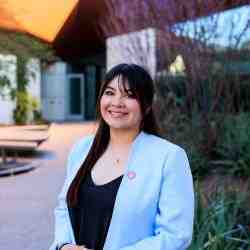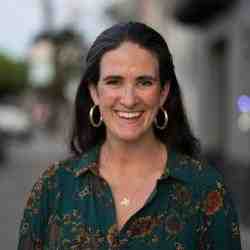Introduzione
Every year, there are about 2.6 million cases of stillbirth worldwide, causing devastating trauma to parents. Medical professional, teachers and communities struggle to support families grieving for their loss. Claudia Ravaldi, a psychiatrist who herself suffered perinatal loss, is equipping Italy and other European countries with the empathy-based tools needed to help parents cope.
La nuova idea
After the tragic loss of her child, Claudia personally experienced isolation by society, an emotional consequence of uncomfortable issue around stillborn babies.
Claudia identifies two mains factors that hinder the healing process of families facing stillbirth. First, the incomplete recognition of mourning by society: society tends not to identify the loss of a child during pregnancy as a real mourning, causing a devastating impact on families. And secondly, the flaws of the healthcare system: International guidelines for stillbirth care are scarcely applied in Europe and are largely ignored by healthcare staff.
As a psychiatrist, Claudia started a research path aimed at investigating a little-known phenomenon usually confined to the sphere of “private matters”, with the aim of improving protection of the health and well-being of thousands of women, couples and families who are facing the difficult path of perinatal mourning.
In order to allow families to be accompanied in the best possible way at a difficult time, Claudia has understood the importance of a holistic approach to the problem and has worked on two different levels: on the one hand, she accompanies families emotionally and encourages the formation of territorial support groups, on the other hand, at the institutional level, pushing hospitals to adopt guidelines and good practices that allow medical staff to have all the necessary tools to better care for families.
Claudia's method has thus allowed not only to fill a void that forced over 2000 families each year to face a traumatic experience in solitude, but also to disseminates good practices that can contribute to reducing preventable cases. She takes care of all families in a secular way and recognizes the need to overcome grief to any loss occurring during pregnancy, including the voluntary interruption of pregnancy (others do this from a religious point of view often resulting in less inclusive practices).
The approach adopted has made it possible to replicate the method in several Italian cities: the support communities are now present in 15 cities and every year 200 new public hospitals are trained on how to integrate guidelines and good practices. The encouraging results achieved in Italy and Claudia's ability to become, with her scientific research and with the experience of CiaoLapo, a point of reference at an international level, are currently paving the way to replicate the method in Spain.
Il problema
Stillbirth, defined as the birth of a baby at or after 28 weeks of gestation, without any signs of life, is one of the most neglected maternal and child health problems. In the year 2015, worldwide the stillbirth rate was 18.4 per 1000 total births. An estimated 2.6 million stillbirths occur annually in the world, out of which 98% occur in low and middle-income countries and more than two thirds occur in rural environments. Despite this large number of cases, the phenomenon of stillbirth continues to be considered as a personal issue and parents who are facing this kind of experience must deal with a society and a medical staff unprepared and incapable of supporting them, with heavy repercussions on their emotional health.
Italy, with 3,3 cases per 1000 births, is in line with the European average, which counts less than 5 cases per 1000 births, but it has one of the worst reduction trends (only 1.1% between 2000 and 2015, against for example 6.8% in the Netherlands).
The issue of stillbirth represents a painful topic and even in developed countries it is ignored and poorly known by health professionals, by other family members and by the whole society.
The uncomfortable feeling of the topic of stillbirth has consequences on the training of medical staff who often do not receive specific training on how to assist these families. The results of a large web-based survey of healthcare professionals and parents in 135 countries show that most of the children who died in utero are removed from their parents without recognition or rituals such as the imposition of the name, funeral ceremonies, the possibility for parents to hold them in arm or dress them. The lack of a ritual to keep a memory of the baby, a baby that parents were eagerly waiting for can make it very difficult to cope.
When a baby dies, the experience is so painful that it often becomes impossible to even speak or think about it. Very often no one knows what to say or no one can find the “right” words. Usually, people prefer to avoid the subject, hiding the event or minimizing its impact.
Academic research states that 30% of women affected by stillbirth suffer from postpartum depression, and many symptoms of anxiety and depression remain stable even during the following pregnancy and even after the birth of a healthy child. According to the study, “Marriage and Cohabitation Outcomes After Pregnancy Loss,” published in the May 2010 issue of Pediatrics, it was found that while the risk of a breakup remained higher for only two or three years for couples who had experienced a miscarriage, it remained higher for up to 10 years after a stillbirth. Stillbirth is without question one of the most distressing experiences of bereavement with long-lasting impact on parents, healthcare professionals and society at large. The diagnosis that a baby will not survive or has already died in utero brings with it a bewildering array of emotional distress where birth and death collide, and parents move from a trajectory of expectation to one of grief. How parents are cared for during this time can have long-lasting consequences, both positive and negative.
The psychosocial impact of stillbirth on parents is well documented in the published literature and a renewed global focus in 2016 on the prevalence of stillbirth and its associated impact has sought to heighten public awareness of stillbirth as a societal issue.
The uneasiness and reluctance to discuss stillbirths represents a barrier to the reduction of those cases that could have been avoided through early prevention and awareness of the medical personnel and of the mothers themselves. Negative effects, particularly on parental mental health, might be moderated by empathic attitudes of care providers and tailored interventions. The World Health Organization estimates that providing better quality of care during pregnancy and childbirth could also prevent over half million of cases.
La strategia
Claudia is working on two different levels: she trains hospitals and public health services to provide adequate support to families and helps them to incorporate at least the International Guidelines for Stillbirth. She also created a network of families and volunteers to support parents who face the loss of a child while working with teachers in schools or kindergartens where little siblings were waiting for their little brother or sister who never came home.
During her research Claudia discovered that in Italy, and many other European countries, the perpetuation of behaviors influenced by ignorance in case of stillbirth, such as: sedations, immediate delivery in the absence of heartbeat, immediate removal of the child from the view of the family, and the sharing of spaces with other women in labor are widely spread harmful practices. Claudia is uprooting those practices with her training reserved for the medical staff in hospitals and birth centers.
According to Claudia’s experience, an adequate mourning process depends strongly on the emotional accompaniment that the parents received from the first moments when they heard the news of the loss of their child. For this reason, Claudia considers it essential to train the medical staff to make them capable of guiding families from the very beginning beyond the strictly medical aspects. Orienting families among the plurality of possibilities they often do not know they have, can be of great help in a moment of deep loss and emotional shock. For this reason, Claudia has promoted the dissemination of MemoryBoxes in all hospitals, a tool dedicated to preserving the memories of the lost child that is very important when the family begins the difficult journey of mourning. Being able to see the child, picking them up, dressing him/her, taking pictures with him, presenting it to other family members are options that families often don't know they can have and that help enormously to build an attachment with the child and create precious memories, of which many families reiterated the importance during the mourning phase. The MemoryBoxes is the result of the comparison of the experiences of hundreds of families and contains several useful objects to build memories that concern the child that parents will be able to access once they are ready. The objects in the Memory Box have formed a self-help book "The Shattered Dream" that Claudia wrote, which contains both practical advice on important choices such as autopsy, funeral rite and burial, as well as a guide to emotions and mourning; a plush toy to give to the child or to keep in his memory; a small blanket handmade to wrap the baby or keep a pair of woolen shoes or bonnet made by other CiaoLapo volunteer parents in memory of the baby.
Claudia reached so far about 200 public hospitals and trains 20 new ones a year with her work, that incorporate the Guidelines on Stillbirth and adopt the practice of the MemoryBox.
Claudia considers the possibility to access to a self-help group to be of fundamental importance for the process of mourning and for this reason she has invested a lot of energy to create support and mutual aid groups both online and physical that can guide families in any time of need. Claudia guarantees a safe space for any loss, also the one of miscarriage in the first trimester of pregnancy, thinking that any mourning has the same dignity and needs recognition. Claudia has a secular approach with her association, and she welcome in her groups also women who decide therapeutic abortion for fetus with severe genetic diseases.
Claudia’s groups are free of charge and she also guarantees 4 free meetings with a volunteer psychologist of her network.
Claudia through her association CiaoLapo offers parents several support options for their loss such as a self-help forum and online support groups. The online forum is freely accessible for reading, but only registered users can post messages. On the forum, families can talk about their experiences and read others' experiences, by sharing their story, their thoughts and emotions and with people who had similar experiences in the past they can take the first step in the pain process. There are sections where specialist volunteers are trained to answer parents' questions.
Another option are the online support groups. The groups of help and self-help (AMA) are the resource that according to international scientific research has proven most effective in the management of perinatal bereavement. CiaoLapo organizes AMA groups online, according to the guidelines of the Stillbirth and Neonatal Death Society English (SANDS-UK) of which is member organization. The groups are held in a chat room about every 7-10 days. These are not therapy groups but help and self-help peer groups. This means that although also the group "operators" take part in it, the activity takes place through the exchange of experiences among participants, with a conductor (which may also be a more experienced user) who is coordinating the group, but he/she do not intervene in a directive way.
Claudia also established in person help groups located throughout Italy: over the years, numerous groups of families and volunteers interested in supporting each other and supporting the activity of CiaoLapo have sprung up in Italy. Each group has a trained coordinator. The coordinators are both professionals and volunteers who periodically receive training on how to encourage the creation of a support community and on how to manage mutual aid groups. To become volunteers, families must overcome their loss and be members for at least one year. Each family has access to 4 sessions of individual therapy for free. In required cases, Claudia recommends them to a specialist to receive more help. This part of Claudia's strategy has meant that CiaoLapo is now present on the Italian territory with 15 groups located in 15 Italian cities and is permanently based at the Gaslini pediatric hospital in Genoa. To date, 14,000 families received advices, support from qualified personnel and exchanged experiences on the online platform, 9,000 families are engaged with peer groups, 1200 families have been supported in new pregnancy and children adoptions. Claudia wrote three illustrated children books to explain baby loss to small children and to give their teachers the tools to face such a difficult topic.
The problems afflicting the Italians families who experienced stillbirth, are the same ones that afflict so many families in the world, and for this reason, the work carried out by Claudia and replicated in many Italian cities and hospitals has great potential even beyond national borders. Thanks to Claudia work 25% of Italian hospitals and birth centers are now adopting Stillbirth guidelines and the MemoryBox.
The great interest aroused at international level by the research and writing work conducted by Claudia and her experience with CiaoLapo are paving the way to the first experiences of replicability of the method in Spain where Claudia is launching supports groups and training medical staff.
CiaoLapo is a scientific and charitable association, composed by physicians, psychologists, midwives and parents who have dealt with the experience of illness and loss during pregnancy or right after birth. CiaoLapo is a not for profit organization relying on the work of Claudia and her volunteers. The income comes from donations, tax deductions, books and merchandising.
La persona
Claudia Ravaldi was born in Modena, Italy, and grew up in a traditional Italian family. As a child she cared very much for her school friends and she became very closed to a school mate who was left behind from the rest of the class. The boy suffered for the death of his father and the kids didn’t know how to approach him. Claudia made sure he was able to talk to her and express his feelings and managed to engage him with the rest of the class.
As a young girl she used to spend a lot of time listening to adults’ conversations. She could feel that there were many secrets hidden for children and she begun to understand that it is possible to talk about any topics if you know how. As a teenager she volunteered in her local church supporting children of low-income families with their homework.
Her family then moved to Prato and Florence where she began her studies in Medicine and Surgery. She specialized in Psychiatry, focusing on themes such as mindfulness, eating disorders, anxiety and depression. In 2006, she became pregnant with her second child, Lapo, who was born dead at the end of the pregnancy. After experiencing herself the flaws of a health system, Claudia decided to become the promoter of a mind change both at the academic and clinical level. A month after the loss of her child, Claudia founded CiaoLapo, the first Italian association created to fill an important gap: the protection of pregnant women, the support to the mourning of the parents, and the accompaniment to the pregnancies following perinatal bereavement. Claudia has dedicated herself since 2006 to the themes of, Stillbirth, Perinatal Psychology and Bereavement care, on which she has published more than 50 scientific articles, as well as five books on the subject of perinatal loss, for parents and professionals and three illustrated children books on the subject of loss and bereavement care.



